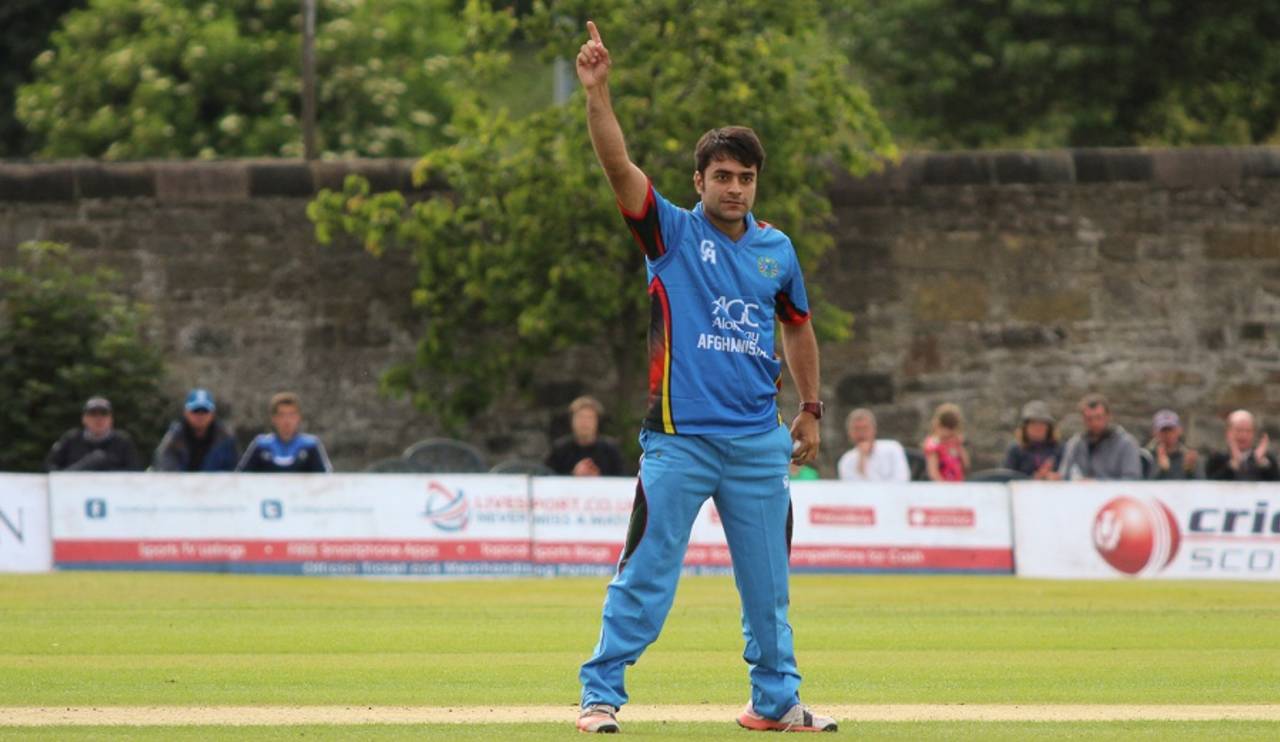Two six-fors in an ODI, and follow-on heroics
And who managed to get a World Cup winner's medal without ever having played an international match?

Times two: Rashid Khan's six-for against Ireland recently made it the second such bowling performance in the match • Peter Della Penna/ESPNcricinfo Ltd
Against Australia in the series which has just ended, KL Rahul became only the fifth batsman to make six scores between 50 and 99 in the same Test series without converting any into a century. The first to do it was the West Indian opener Conrad Hunte, in the five-match home series against Australia in 1964-65. He was followed by Allan Border in 1989, and Mike Atherton in 1993, both in six-Test Ashes series in England. The most recent addition to the list before Rahul - and the only other man to achieve it in a four-match series - was the Australian opener Chris Rogers, in the last Border-Gavaskar Trophy battle, in Australia in 2014-15. If you include centuries, there have been 26 further cases of a batsman reaching 50 on six occasions during a Test series, and nine cases of seven - the most meritorious probably by England's Patsy Hendren, who made two hundreds (including a double) and five fifties* from eight innings in the series in the West Indies in 1929-30 (his other innings was an unbeaten 36), and Sunil Gavaskar, whose debut series for India in the West Indies in 1970-71 saw him pass 50 in seven of his eight innings, with four centuries, one of them also a double (his only failure being a knock of 1).
Those hauls by Paul Stirling (who took 6 for 55) and 18-year-old Rashid Khan (6 for 43) in the second match of the recent series between Ireland and Afghanistan in Greater Noida marked the first time in 3851 one-day internationals that two bowlers had taken six wickets in the same match. There are only ten other cases of two five-fors, including one instance by two bowlers on the same side - Greg Chappell (5 for 20) and Gary Cosier (5 for 18) for Australia against England at Edgbaston in 1977.

VVS Laxman's memorable 281 against Australia in Kolkata in 2000-01 was indeed a remarkable innings - but it wasn't quite the Test record for a follow-on. That is still held by Hanif Mohammad, with his match-saving 337 for Pakistan against West Indies in Bridgetown in 1957-58. There have been five other double-centuries in follow-ons: 275 by Gary Kirsten for South Africa against England in Durban in 1999-2000, 237 by Salim Malik for Pakistan against Australia in Rawalpindi in 1994-95, 232 not out by Andy Flower for Zimbabwe against India in Nagpur in 2000-01, 218 by Darren Bravo for West Indies against New Zealand in Dunedin in 2013-14, and 200 by Dilip Sardesai for India against New Zealand in Bombay (now Mumbai) in 1964-65.
There have been eight Tests in which one side returned identical all-out totals. The highest score involved is a pair of 306s, by Sri Lanka against South Africa in Cape Town in 1997-98, although India did make 407 and 407 for 9 declared against Pakistan in Kolkata in 2004-05. Of the other doubles, the highest two were by New Zealand, who made 279 twice against India in Hamilton in 2008-09, and twin 208s v West Indies in Wellington in 1955-56. Then come the following repeats: 201 twice by India against Australia in Sydney in 1980-81, 172 and 172 by New Zealand against South Africa in Wellington in 1952-53, twin 161s by New Zealand against Australia in Hobart in 1993-94, 148 and 148 by Bangladesh against Pakistan in Chittagong in 2001-02, and two 136s by India against Australia in Calcutta (now Kolkata) in 1956-57.

You would do well to get this right in a quiz: the answer is the Jamaican fast bowler Jermaine Lawson, in a remarkable spell for West Indies against Bangladesh in Dhaka in 2002-03. Once Lawson got going, Bangladesh crashed from 80 for 3 to 87 all out. All his wickets came in the space of 15 balls, during which he didn't concede a run, leading to final figures of 6.5-4-3-6. Lawson played only 12 other Tests, finishing with 51 wickets, in a career clouded by doubts about his bowling action.
The express fast bowler Shaun Tait was part of the Australian side which won the 2007 World Cup final against Sri Lanka in Bridgetown. Although he failed to strike in the final, he took 23 wickets in that tournament, behind only his team-mate Glenn McGrath (26). But Tait's career tally of 35 one-day caps is quite a few more than several of the West Indian players in 1975, a time when one-day internationals were few and far between. Rohan Kanhai played only seven ODIs - the last of them the first final, as West Indies beat Australia at Lord's - and Keith Boyce eight. Maurice Foster and Lance Gibbs, who were in that West Indian squad but didn't play in the final, appeared in only two and three ODIs respectively. But the unbeatable winner in this respect is the Delhi left-arm seamer Sunil Valson, who was part of the 14-man squad for the 1983 World Cup, but didn't get a game as India pulled off their upset victory in the final at Lord's. And indeed Valson never got on to the field for India in an international match… but he did get a World Cup winner's medal.
Steven Lynch is the editor of the updated edition of Wisden on the Ashes